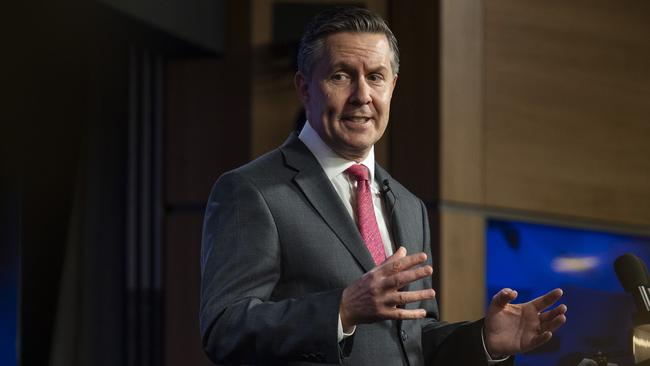Free lung cancer scans for smokers and former smokers
Australians will be screened for lung cancer every two years under a new world first cancer prevention program expected to save 12,000 lives. Who is eligible?
National
Don't miss out on the headlines from National. Followed categories will be added to My News.
EXCLUSIVE
Australians will be screened for lung cancer every two years under a new world first cancer prevention program expected to save 12,000 lives.
From July 2025, smokers and former smokers aged 55-74 will be able to ask their GP to order a free scan called a low-dose computed tomography (CT scan) to check for cancer every two years until they turn 74.
Health Minister Mark Butler yesterday announced the $234 million program that was first revealed by us in April.

A further $240 million will be spent building a culturally appropriate lung cancer screening program for indigenous Australians who are far more likely to die from the cancer.
Lung cancer is the leading cause of cancer death in Australia, and only one in five people diagnosed are still alive five years later.
The Lung Foundation of Australia said it was “absolutely thrilled” with the announcement of a National Targeted Lung Cancer Screening Program.
“For more than five years our community has fiercely advocated for this program to help address the inequity outcomes of Australia’s biggest cancer killer – lung cancer – and today we can finally say we have achieved that goal. We commend the Albanese Government and Minister Butler for investing in lung cancer screening and look forward to a future where less Australians lose their life to lung cancer,” said Mark Brooke, CEO Lung Foundation Australia.
Cancer Australia also welcomed the new program.

“Lung cancer is Australia’s biggest cancer killer, and we know that early detection is key to improving survival rates. The new screening program will help to identify lung cancer at an earlier stage when treatment is more likely to be successful,” said Cancer Australia CEO Professor Dorothy Keefe.
“Australia’s new National Lung Cancer Screening Program is the among the first in the world, representing a significant step forward in the global effort to tackle lung cancer and positioning Australia as a world leader in this area,” she said.
‘HOW I GOT LUNG CANCER AFTER A BROKEN LEG’
Non-smoker Stacey Allerton’s job was to help others quit cigarettes but eight weeks ago a mystery broken leg led to her own shock lung cancer diagnosis.
The 43-year-old stepmother of two was devastated to learn the cancer had already spread to her brain and bones and she is pleading for a national lung cancer screening program to be funded in the Federal Budget.
“I was quite aware of lung health, however I did not know that one in five people with lung cancer have never smoked and that essentially if you had lungs, you have the risk of developing lung cancer,” she said.
“A screening program would be invaluable. I just don’t think you can put a price on early detection and saving lives.”

Ms Allerton is not alone in her calls.
Cancer Australia as well as the Medical Services Advisory Committee — the government body that decides which new health treatments get funded — have both recommended a national lung cancer screening program be funded in the May budget.
It would for the first time see Australians scanned for our deadliest cancer, which claims a life almost hourly.
Health Minster Mark Butler would not comment on budget speculation, but a spokesman said “lung cancer screening is a really exciting opportunity to build on our really proud record of cancer screening in cervical cancer, breast cancer and bowel cancer.” To date no funding has been allocated.
It’s estimated the program would save 12,000 lives in the first decade.
Just one in five people diagnosed with the cancer will be alive five years later — the lowest survival rate of Australia’s five most common cancers.
Currently almost half (around 42 per cent) of lung cancers are diagnosed at stage 4, when survival rates are low.
“I’m cautiously optimistic that there will be several pilot projects announced in the budget so if there isn’t (funds for a screening program), I think the lung cancer community can feel very let down,” Lung Foundation Australia chief executive Mark Brooke said.
Under a national screening program, people aged 55 and over (50 years old for Indigenous Australians) who are current or former smokers would get their GP to order a free scan, called a low-dose computed tomography (CT scan), to check for cancer every two years until they turn 74.
Younger people, like Ms Allerton who had a family history of lung cancer and a rare genetic mutation would be able to pay around $300 for the same scan and may be able to claim a new Medicare rebate.

Ms Allerton said she had experienced mild breathlessness and fatigue but had no clue she had advanced lung cancer until one night she broke her leg simply walking upstairs to go to bed.
“The cause of the broken leg was lung cancer. By the time I broke my leg, the cancer has spread throughout my body, including to my bones and brain,” she said.
“The most ironic thing about all of this is that I used to support people to quit smoking. I was quite aware of lung health.
“It would have been great if I could have gone to my GP with some early warning signs and had an opportunity to screen and have this found much earlier than what it was.
“I’m trying to be very pragmatic about it. And I certainly have age on my side to hopefully recover quickly.”
Originally published as Free lung cancer scans for smokers and former smokers



